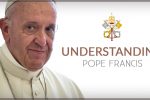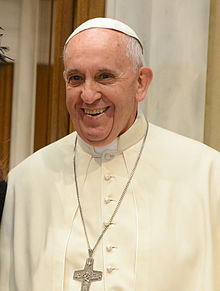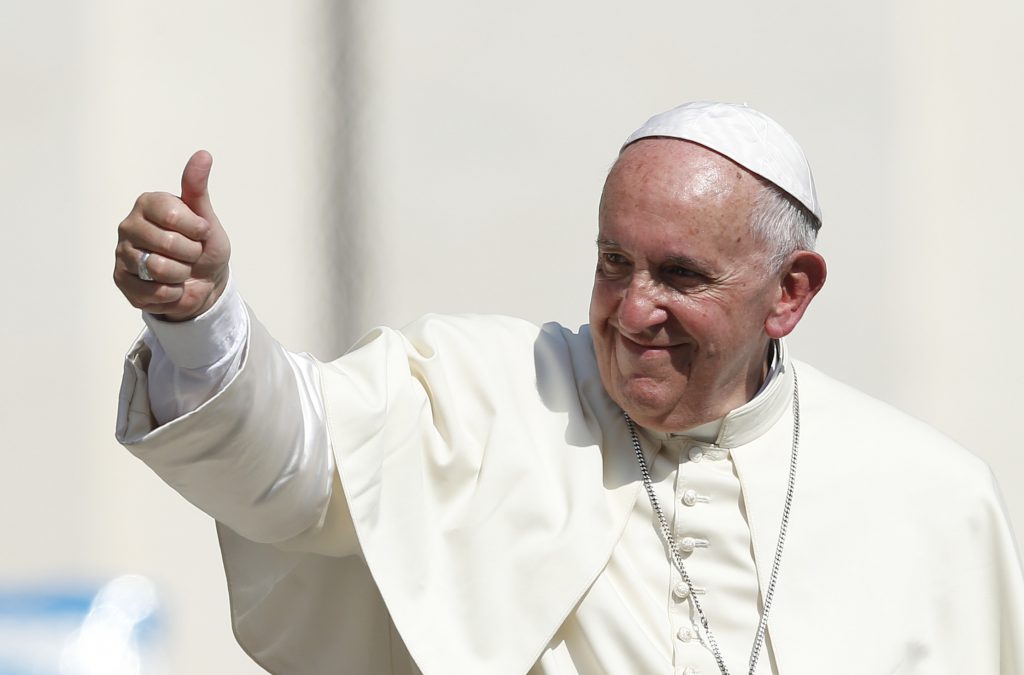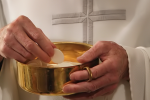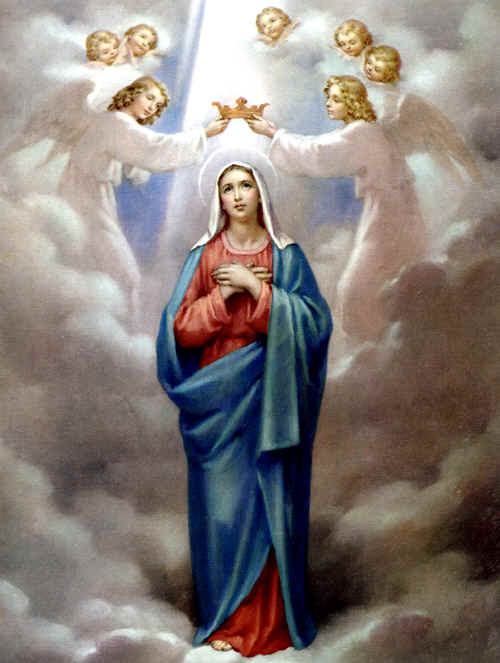What Did Pope Francis Say About “Many Paths” to God?

Pope Francis’s recent statement in the context of an interreligious gathering of youth in Singapore is making the rounds, folks, in case you haven’t heard! I will quote his actual words below. But first, a few preliminary notes.
- Popes can make mistakes folks when we are talking about non-infallible statements. And this statement was not only not an infallible statement, but it did not even appear to be a magisterial statement of the pope at all. At least, not at the outset. However, because it appears that an alleged modification tantamount to a “correction” was made to the statement and put on the Vatican website and then removed from the statement, that the pope does seem to have doubled down on the point he made. Thus, it does appear to represent the mind of the Holy Father.
- Any doubt of its magisterial nature will be removed if and when this talk of the Holy Father is published in the AAS (Acta Apostolicae Sedis, which is a key instrument for the Holy See to record “official” acts of the Holy See). Don’t get me wrong here, the pope can make a magisterial statement using any instrument he wills to, and at any time—he is entirely free in this matter—but when a statement is “officially” published in the AAS, that is a good indicator that we are now talking about either a magisterial teaching, or the issuance of some form of non-magisterial, juridical or disciplinary act. You’ll also find things like ecclesiastical appointments and the like as well in the AAS. But the point here is this: all of these declarations would represent binding statements of the Holy See in accordance with the degree of binding authority the statement retains.
- Could the statement we will look at below still be modified before it goes into the AAS? Yes, it could be. Or, it may not be published in the AAS at all. But as far as a change is concerned, we have precedent, for example, with Pope St. John Paul II’s famous statement first published in the L’Osservatore Romano, August 4, 1999, and it read:
Eternal damnation remains a real possibility, but we are not granted, without special divine revelation, the knowledge of whether or which human beings are effectively involved in it.
This statement was obviously problematic because it appeared to say it is possible that hell could actually be empty. This is very different than Pope Francis expressing in his personal prayer life that he imagines Hell to be empty. That is just a way of expressing the infallible Catholic teaching that declares God’s universal salvific will (see I Tim. 2:4; II Peter 3:9; CCC 851). Pope St. John Paul II went beyond expressing a wish or desire; rather, he declared as a fact that hell could be empty. However, the point is, like the now-famous statement of Pope Francis, at the time the statement was made, it was not magisterial. However, some months later, when this statement was placed into the AAS, “whether or” was edited out. Thus, the official and magisterial statement of the Pope reads:
Eternal damnation remains a real possibility, but we are not granted, without special divine revelation, the knowledge of which human beings are effectively involved in it.
There is a huge difference—a substantial difference—between the original and the modified position.
Now, I add this point because I must say that I will happily eat my words here if Pope Francis does modify his words. It does not appear he will. And as I point out below, if he doesn’t, it does not matter because his words were not contrary to the Faith anyway.
Now then, I say all that to say this: all those who are once again jumping into the fray to say “the pope is wrong…” “a material heretic…” “a heretic…” should re-think their position. If one has questions about the pope’s statement, ask them respectfully. But passing judgment even at this juncture is not wise. The pope’s statement is certainly not heretical, nor is it contrary to Scripture or to any Catholic teaching. But unfortunately, I have seen extremists—in predictable and Americanist fashion—calling on the pope “to step down.” I can imagine these Americanists will soon have another protest rally! And you have the usual suspects calling the pope a heretic. They are saying, “The pope says we don’t need Jesus!” “The Pope says Jesus is not the only way to salvation!” And there are many more such false claims being made that are scandalous to the “little ones” in Christ.
So, Let’s Have It. What Did the Pope Say?
As always, when evaluating the statements of the Holy See, we have to look at the language the pope uses, the nature of the document he employs, and in time, things like the number of times the teaching is reiterated, and more. And as I said above, I do not see anything in this statement of Pope Francis that would make it a binding statement at all at this point. But we also have to look at the nature of the doctrine being considered. And in this case, those claiming the pope is in error are talking about a doctrine already infallibly defined by the Church, i.e., that Jesus Christ is the only way to salvation. Thus, those making this claim are not only just wrong, but they are treading on very dangerous grounds. They are claiming the pope to be, at least, a material heretic here. That presents all sorts of problems beyond the scope of what I can get to in this brief article.
So, what did Pope Francis say? And is his statement contrary to the Faith of the Church? When the pope said, “… every religion is a way to arrive at God… like different languages to arrive at God… But God is a God for all… and if God is a God for all, then we are all sons and daughters of God… there is only one God, and each of us has a language, so to speak, in order to arrive at God,” every word of this can be squared with Scripture as well as the teaching of the Church.
The simple truth is, folks, that there are “many paths to God” that in no way contradicts the fact that Jesus Christ is the “only way” or “only path” to God and salvation. Now I have to say that I do sympathize with the difficulty—and outright outrage—that our Protestant Evangelical and Fundamentalist friends would have with this statement. After all, Jesus did say, “I am the way, the truth, and the life, no man comes to the Father except by me” (John 14:6). Period. But I must say I am a bit surprised that this is so difficult for even some clergy in the Catholic Church to grasp, albeit some few, but very loud clergy.
Why do I say this?
Well, we Catholics are the ones who rightly call priests Father even though Jesus says, “call no man father” in Matt. 23:9. I shouldn’t have to explain this to Catholics the same way I explain it to my Protestant interlocuters. But I suppose I should give us a bit of a refresher here:
- In Luke 16:24, Jesus calls Abraham “Father Abraham,” as does St. James in James 2:21; and St. Paul eight times in Romans 4:1-18.
- In I Cor. 4:14-15, St. Paul says we have “many fathers” and that he is a “father” to the Corinthians.
- St. Stephen refers to the elders of Jerusalem as “fathers” in Acts 7:1-2.
- St. John refers to the elders to whom he is writing as “fathers” to their spiritual sons and daughters in I John 2:13.
- In Eph. 6:1-2, St. Paul quotes the Ten Commandments (the Fourth Commandment) in declaring, “Honor your father and mother…”
And I could list many, many like examples. But in Eph. 3:14-15, St. Paul gives us the key to understanding when he says—and I am quoting the Douay-Rheims here because it gets closest to the Greek original:
For this cause I bow my knees to the Father (Gr. patera) of our Lord Jesus Christ, of whom all paternity (pasa patria, all “fatherhood”) in heaven and earth is named (or, derives its authority).
The key is understanding that Jesus was not condemning using the word “pater” with regard to a human being. If he was then he would have been contradicting himself. And so also would be a litany of inspired authors of Sacred Scripture. Jesus was condemning the usurpation of the fatherhood of God. All of the examples of true “fatherhood” mentioned above and many more I could list from Sacred Scripture are examples of human beings properly participating in the unique fatherhood of God. The fact that these are truly fathers does not somehow mean that God is no longer our one Father in heaven.
And remember, folks, this does not just apply to calling priests “father.” The principle of participatio in the divine, or, as our Eastern brothers call it, theosis, is extremely important in New Testament and Catholic theology. And I could list a litany of examples of how this is so. But just consider these few:
- Jesus is revealed to be our one teacher in Matt. 23:8, yet we have many “teachers” in the Church and in Jesus Christ (James 3:1; Eph. 4:11).
- Jesus is our “one mediator” (I Tim. 2:5) and unique “intercessor” (Heb. 7:24-25) and yet we are all called to be “mediators” and “intercessors” in Christ as Christians (I Peter 2:5-9; I Tim. 2:1-4).
- Jesus is our unique “pastor” and “bishop” (I Peter 2:25; John 10:16) and yet we have many “pastors” and “bishops” in the Church and in Jesus Christ (Eph. 4:11; I Tim. 3:1; John 21:15-17).
- Jesus is our one priest and our one high priest (Heb. 7:22; 3:1) and yet we have many “priests” and “high priests” in the Church (I Peter 2:5-9-CCC 662; Romans 15:15-16; CCC 1557).
- Jesus is our one “leader,” yet we have many “leaders” in the Church (Matt. 23:10; Heb. 13:17).
- Jesus is our “only savior” and yet, we, and the Church in general, are called to “save souls” by cooperation with the grace of Jesus Christ and in Jesus Christ (Titus 2:13; I Cor. 9:22; Romans 11:14; James 5:19-20; Col. 1:24).
- Jesus is our hope according to Col. 1:27, yet we have many holy “fathers” and “mothers” Scripture teaches us to look to as sources of inspiration and hope for us in God, or, in Christ (Is. 51:1-2; I Cor. 4:14-15).
And I could go on with more examples. But the key to understanding is understanding the very Catholic and biblical doctrine of theosis (see II Peter 1:1-4).
Objection!
I know people will say to me now that all I’ve said above does not apply because Pope Francis was not talking about Christians functioning in Christ by way of theosis; rather, he was talking about non-Christian religions being “paths to God and salvation.” And thus, they will say, theosis does not apply precisely because these people involved are not in Christ. Moreover,” they will say, “this represents many paths outside of and apart from Christ to salvation. And that is heresy!”
And that represents a very good question.
And, of course, if the pope or anyone were to say that one can be saved apart from Christ and via some “other path” to salvation outside of Christ, that would not only be wrong, but that would be heresy. But that is not what Pope Francis said. In fact, both Pope Francis himself and CCC 830-848, make very clear that there is no other way to heaven, except via Jesus Christ.
Pope: Jesus is the only door to eternal life | Catholic News Agency
As Catholics we understand that it is precisely because of God’s universal salvific will coupled with his revealed will for man to freely cooperate with grace in order to actualize his salvific plan, that God chooses to use as his instruments men both in the Church and outside of the visible boundaries of the Catholic Church to be instruments of grace in various and manifold ways, sometimes known to God alone (see CCC 307: 2006-2011; Lumen Gentium, 16).
Here is where we get to the nitty gritty of answering this question. The Dogmatic Constitution on the Church, Lumen Gentium, 14-16 beautifully presents the truth, especially in section 14, how God first and ordinarily uses his One, Holy, Catholic and Apostolic Church as his instrument to bring salvation to the world. And here the Church teaches the infallible teaching of the Church that says:
Basing itself upon Sacred Scripture and Tradition, it teaches that the Church, now sojourning on earth as an exile, is necessary for salvation. Christ, present to us in His Body, which is the Church, is the one Mediator and the unique way of salvation. In explicit terms He Himself affirmed the necessity of faith and baptism and thereby affirmed also the necessity of the Church, for through baptism as through a door men enter the Church. Whosoever, therefore, knowing that the Catholic Church was made necessary by Christ, would refuse to enter or to remain in it, could not be saved.
They are fully incorporated in the society of the Church who, possessing the Spirit of Christ accept her entire system and all the means of salvation given to her, and are united with her as part of her visible bodily structure and through her with Christ, who rules her through the Supreme Pontiff and the bishops. The bonds which bind men to the Church in a visible way are profession of faith, the sacraments, and ecclesiastical government and communion. He is not saved, however, who, though part of the body of the Church, does not persevere in charity. He remains indeed in the bosom of the Church, but, as it were, only in a “bodily” manner and not “in his heart.” All the Church’s children should remember that their exalted status is to be attributed not to their own merits but to the special grace of Christ. If they fail moreover to respond to that grace in thought, word and deed, not only shall they not be saved but they will be the more severely judged.
That is beautifully said, indeed. There is no salvation apart from Christ and apart from his Church. However, beginning in section 15, and then into section 16 of Lumen Gentium, the magisterium of the Church goes on to point out the fact that God can use as his instruments of grace, not only persons formally in union with Christ in his Church, but he can and does use as instrumental causes of salvation non-Catholics or even non-Christians, at times. Lumen Gentium 15 focuses on how the various and sundry Christian sects not fully in union with the Bishop of Rome, can be and are “joined” to Jesus in his Church albeit imperfectly. They are so joined to the Church via the valid sacraments that these sects possess, like Baptism and Holy Matrimony in the case of our Protestant friends. Or, all seven sacraments in the case of the Orthodox churches. This grace can also be communicated through the various truths these various sects hold that is in keeping with the truth of Scripture, Tradition, as interpreted by the Magisterium of the Church. I could list many of these, like the truth of the Blessed Trinity, the Hypostatic Union, the inspiration of Scripture, the blood atonement of Christ on the cross, God’s universal salvific will (at least some Protestants agree here), the necessity of faith in Jesus Christ for salvation, water baptism in the name of the Father, Son, and Holy Spirit, etc. These and other truths are also means of grace and salvation (see John 15:3).
Now, having said this, I must note that this salvation would only be effectual in the lives of these Christians if they have never knowingly rejected the truth concerning the One, Holy, Catholic, and Apostolic Church—the Catholic Church—and only if they persevere in grace firmly until their deaths (see Matt. 10:22; Rev. 2:10).
But finally, and more to the point at hand, when it comes to non-Christian religions and even professed atheists, they can be “related” to Jesus Christ in his Church through their tenants of Faith that are true, like the Muslims who believe God to be “one, self-subsistent, omniscient, omnipresent, and omnipotent.” Inasmuch as they believe that to be the truth, they possess the truth, in fact, on that point of faith that is foundational to our Catholic Faith. And when it comes even to atheists and agnostics, LG 16 refers to truths they may possess as “images and shadows” of truth that through the grace of Christ and his Church can serve “as a preparation for the Gospel… given by Him who enlightens all men so that they may finally have life.” These “images and shadows” both presuppose and can be occasions, or even avenues whereby God communicates particular graces to them, drawing them to the grace of the sacrament of baptism even if they do not know what baptism is! And if they were to die in a state where they had not rejected the truth of Christ and his Church; rather, they had clung to the truths they did possess by grace, they would then have the possibility of receiving what the Church calls a kind of “baptism of desire.” And so, they would be finally saved.
How Does This Work in the Lives of Real People?
How does all of this theology work out in the lives of real people outside of the visible Church? And how do the words of Pope Francis come into play?
Let’s take the example of a hypothetical Muslim who only knows who Jesus Christ is as a distorted version of a 4th of 5 major prophets who will one day “crush all crosses” and establish Islam all over the world. Well, as long he does not knowingly reject the truth of Christ and his Church, and he attempts to obey and follow “the one true God,” in cooperation with the grace God gives to him, he can be (possibly) saved. Not through his errant beliefs about Jesus Christ, but through the truths he holds concerning God and other matters (i.e. God will judge all at the end of time, belief in angels, etc.). And as per the words of Pope Francis, inasmuch as he is worshipping and following “the one true God” along with us, and he does not reject the truth as God alone knows it to have been revealed to him, he is on a true path to heaven. This not to deny Christ is the only way, and the only path to heaven; it is simply to uphold the teaching of Scripture and the Catholic Church that says people can be saved outside the visible boundaries of the Catholic Church. It is no more a contradiction to say there can be “many paths” to heaven either “joined to” or “related to” the “one true path” to heaven, than it is contrary to Scripture or the teaching of the Church to say there are “many priests” even though Christ is our “one priest.” Christ is our “one teacher” even though there are many teachers. The key is in Christ. And yes, if a soul is going to be saved outside of the visible boundaries of the Catholic Church, they will ultimately be saved through the grace of God that comes solely and ultimately through Jesus Christ and his Church.
Moreover, I must reiterate and develop this crucial point: this hypothetical Muslim is not going to be saved through Islam or through the teachings of Muhammad. He is going to be saved through the truths taught in Islam that concur with the truth of Christ and his Church by way of participation. Remember: as St. James says it in James 1:17: “Every good endowment and every perfect gift is from above, coming down from the Father of lights with whom there is no variation or shadow due to change.” Thus, the truth is truth no matter who says it or writes it. And we Catholics rejoice in that truth no matter where it may be found. When Mohammad teaches “God is one,” in agreement with our Jewish friends, and in agreement with Jesus Christ in his Church, we say, “Amen!” That is a gift from God that by its very nature, as truth, serves to “make [its adherents] free” (John 8:31-32). And thus, a Muslim that is walking in the grace of God, believing that God is absolutely One God, never having knowingly rejected the truth concerning Jesus Christ and his Church, may well be walking on a path to heaven. That is not a path apart from Christ. That is a path that is in Jesus Christ, even if the Muslim does not know it!
Can I Get a Witness?
Now that my Catholic friends are entirely on board with me—and with the pope, let me, in closing challenge my Evangelical and Fundamentalist friends who still do not agree. I say that because I know when I was Evangelical, I did not believe in the possibility of anyone to be saved who does not make a public confession of faith in Jesus Christ. Don’t we see examples of people not yet believing the fullness of the Gospel being accepted by God in Sacred Scripture? Think of Apollos in Acts 18. While he was still Jewish, not having been validly baptized:
Now a Jew named Apol′los, a native of Alexandria, came to Ephesus. He was an eloquent man, well versed in the scriptures. 25 He had been instructed in the way of the Lord; and being fervent in spirit, he spoke and taught accurately the things concerning Jesus, though he knew only the baptism of John. 26 He began to speak boldly in the synagogue; but when Priscilla and Aquila heard him, they took him and expounded to him the way of God more accurately. 27 And when he wished to cross to Acha′ia, the brethren encouraged him and wrote to the disciples to receive him. When he arrived, he greatly helped those who through grace had believed, 28 for he powerfully confuted the Jews in public, showing by the scriptures that the Christ was Jesus.
Notice, he was a Jew who believed in Jesus, but only had the baptism of St. John the Baptist, which was an invalid baptism. Yet, the inspired author could say he was “instructed in the way of the Lord… fervent in spirit… taught accurately the things concerning Jesus… greatly helped those who through grace had believed… confuted the Jews in public, showing by the scriptures that the Christ was Jesus,” yet he was not even a Christian yet. He would then be baptized through the ministry of Priscilla and Aquila, yet we know the Holy Spirit was already active in his life. He was already on a path to heaven even before he received the gift of baptism and was incorporated into Jesus Christ (Romans 6:3-4).
But now, for my Protestant friends who do not believe in baptismal regeneration, and would say Apollos was already “born again” before he was baptized, think about Cornelius in Acts 10:1-4:
At Caesare′a there was a man named Cornelius, a centurion of what was known as the Italian Cohort, 2 a devout man who feared God with all his household, gave alms liberally to the people, and prayed constantly to God. 3 About the ninth hour of the day he saw clearly in a vision an angel of God coming in and saying to him, “Cornelius.” 4 And he stared at him in terror, and said, “What is it, Lord?” And he said to him, “Your prayers and your alms have ascended as a memorial before God.
Cornelius did not know Jesus yet. He was a “God-fearer” as a gentile who believed in the God of the Jews, prayed to the God of the Jews, and gave alms at the temple. He may well have heard of Jesus, but he had not professed faith in him. He had not been baptized. He had not received the Holy Spirit, and yet already his prayers and alms had “ascended as a memorial before God.” The Greek word there for memorial is “anamnesis.” This clearly represents a memorial sacrifice acceptable to God even before he came to Christ. In fact, as the above was happening Jesus revealed to St. Peter that he was to go and visit Cornelius. And when Peter met him, and still before Peter even preached Jesus to Cornelius, before Cornelius ever professed faith in Christ, or was baptized, or received the Holy Spirit, St. Peter concluded:
And Peter opened his mouth and said: “Truly I perceive that God shows no partiality, but in every nation anyone who fears him and does what is right is acceptable to him” (34-35).
Cornelius was not a Christian yet, but he was on a path to heaven that was “different” than the path Apollos was on, but both of these paths were truly paths to heaven as Pope Francis said because both of these paths represent imperfect participation in the one true path to heaven in Jesus Christ.
Moreover, we could consider the fascinating words of St. Paul on Mars Hill in Athens found in Acts 17:26-29, who was speaking to a similar audience Pope Francis was speaking to in Singapore:
And he made from one every nation of men to live on all the face of the earth, having determined allotted periods and the boundaries of their habitation, 27 that they should seek God, in the hope that they might feel after him and find him. Yet he is not far from each one of us, 28 for ‘In him we live and move and have our being’; as even some of your poets have said, ‘For we are indeed his offspring.’ 29 Being then God’s offspring…
And then St. Paul calls all who were present there to repent and come to Christ. But did you notice how St. Paul refers to every single person that has ever lived there… that they should “seek God” and that they also could “find him?” Of course, they could… but it would have to be by grace, of course, if it was going to be salvific. But they could! And then notice, St. Paul quotes two Stoics in Epimenides—a sixth-century BC poet and philosopher) and Aratus, from his Phaenomena 2–5. Or, it may have been from a fourth-century Stoic in Cleanthes, from his Hymn to Zeus. They both said the same words in different poems. But here is the key: Even though Epimenides, as a Stoic and pantheist would have meant something very different from what we do as Catholics when he said, “… in him we live, move and have our being,” St. Paul quotes it as being true because it is true that “in him we live, move and have our being.”
And did you notice as well that St. Paul would agree with Pope Francis that every single person that has ever lived is “a child of God?” He quotes Aratus as saying, “For we are indeed his offspring” and then follows up by agreeing, saying, “Being then God’s offspring…”
Thus, it is crucial that we get this right, folks. Pope Francis is right. All of mankind has a relationship with God rooted in our common humanity. All of us come from Adam and Eve. As such we are all God’s children (see also Luke 3:38). That relationship with God does not mean we are all going to heaven, though folks! Not at all. But it does mean “we are all sons and daughters of God” as Pope Francis said.
But having said that, the “sonship” we all acquire by grace through faith and baptism whereby we are incorporated into Jesus Christ and become “sons of God” in an unheard-of sense (see Romans 6:3-4; Gal. 3:27; Gal. 4:4-6; Romans 8:14-17; II Peter 1:3-4, etc.), is of an entirely different order. And that relationship alone will get you to heaven. But notice, for our point here, St. Paul has no problem with understanding that truth is truth no matter the source. It is, as we saw before from St. James 1:17, “a gift from God.” Well, as such, for the pagan who did not have Jesus Christ and the New Covenant, these truths from Aratus and Epimenides could be parts of “a true path” that could lead them to heaven. Again, not apart from Christ. In Christ!
It is no wonder that St. Paul could say of pagans who do not have the fullness of truth that they “have no excuse” when it comes to belief in God because:
Ever since the creation of the world his invisible nature, namely, his eternal power and deity, has been clearly perceived in the things that have been made (Romans 1:20).
And it is no wonder St. Paul would say these pagans who have no knowledge of God’s covenant could also be saved:
When Gentiles who have not the law do by nature what the law requires, they are a law to themselves, even though they do not have the law. They show that what the law requires is written on their hearts, while their conscience also bears witness and their conflicting thoughts accuse or perhaps excuse them on that day when, according to my gospel, God judges the secrets of men by Christ Jesus (Romans 2:14-16).
Notice, they can be either “accuse[d]” or “excuse[d]” on judgment day. Well, how can that be unless they had been traversing “a path” toward heaven while they were alive, right? And one more time I must say, whatever that path was and wherever it led them, it would not be a path that was apart from Christ; rather, it had to be in Christ. “A path” different, in one sense, from the path Apollos took, or Cornelius took, or the paths taken today by members of the thousands of sects that have separated themselves from the One, Holy, Catholic, and Apostolic Church—the Catholic Church. But it is only inasmuch as these many paths we have talked about and the many, many more we could talk about, participate in part in the one, true path to heaven that is “the way, the truth, and the life”—Jesus Christ—that it can possibly be a path that can lead souls to heaven.
